Organisational Behaviour Report: Richmond Hill Hotel, UK - OB Analysis
VerifiedAdded on 2023/01/19
|17
|5670
|36
Report
AI Summary
This report provides a comprehensive analysis of organizational behavior within the context of the Richmond Hill Hotel, UK. It explores how organizational culture, including person, task, role, and power cultures, influences individual and team behavior and performance. The report examines the impact of organizational power dynamics, such as reward and coercive power, and organizational politics on employee actions. Furthermore, it evaluates content and process theories of motivation, including Maslow's hierarchy of needs, and motivational techniques to achieve organizational goals. The analysis extends to team development, identifying the characteristics of effective and ineffective teams, and applying concepts and philosophies of organizational behavior within a given business situation. The report concludes with a critical evaluation of the relationship between culture, politics, power, and motivation, offering recommendations for organizational success.
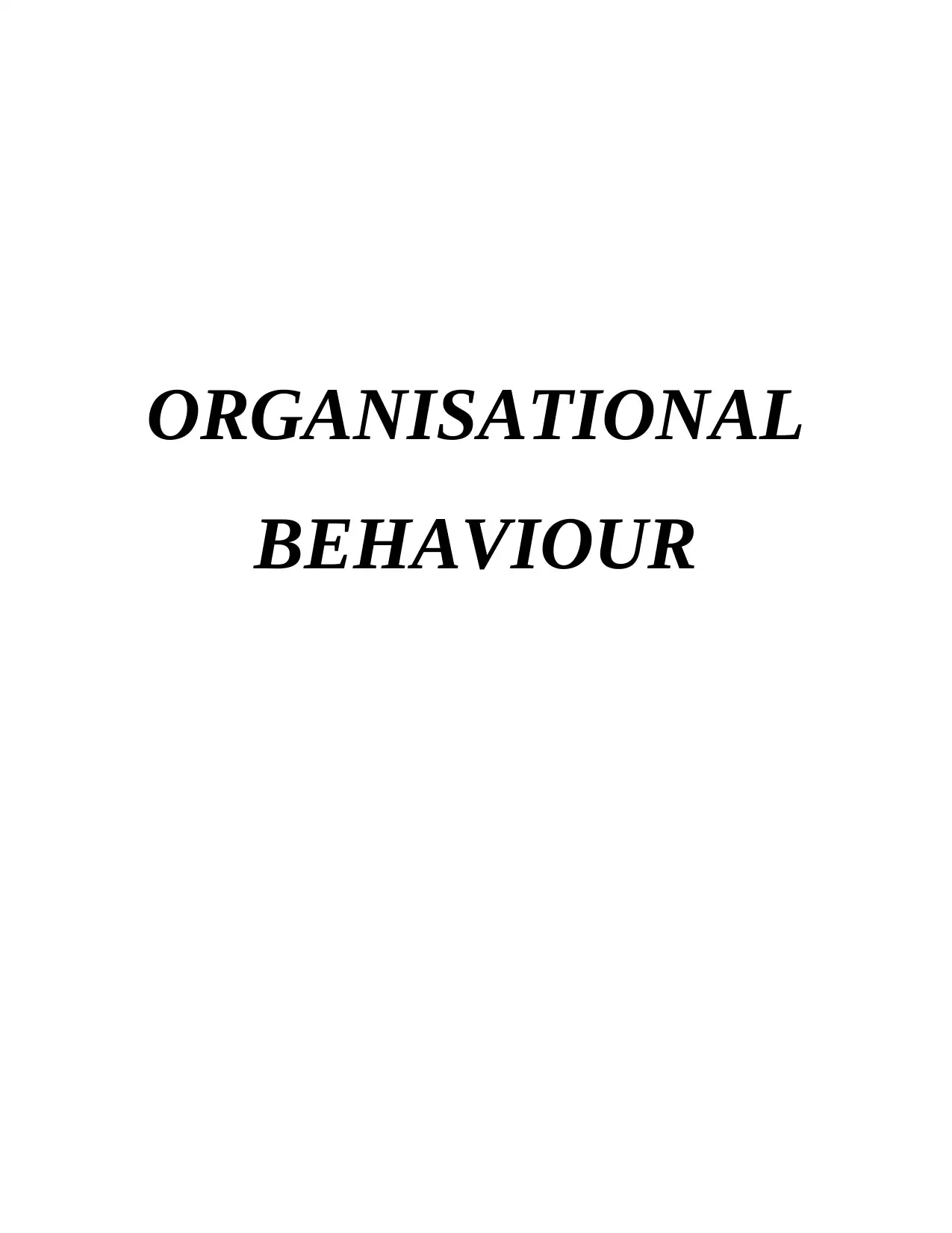
ORGANISATIONAL
BEHAVIOUR
BEHAVIOUR
Paraphrase This Document
Need a fresh take? Get an instant paraphrase of this document with our AI Paraphraser
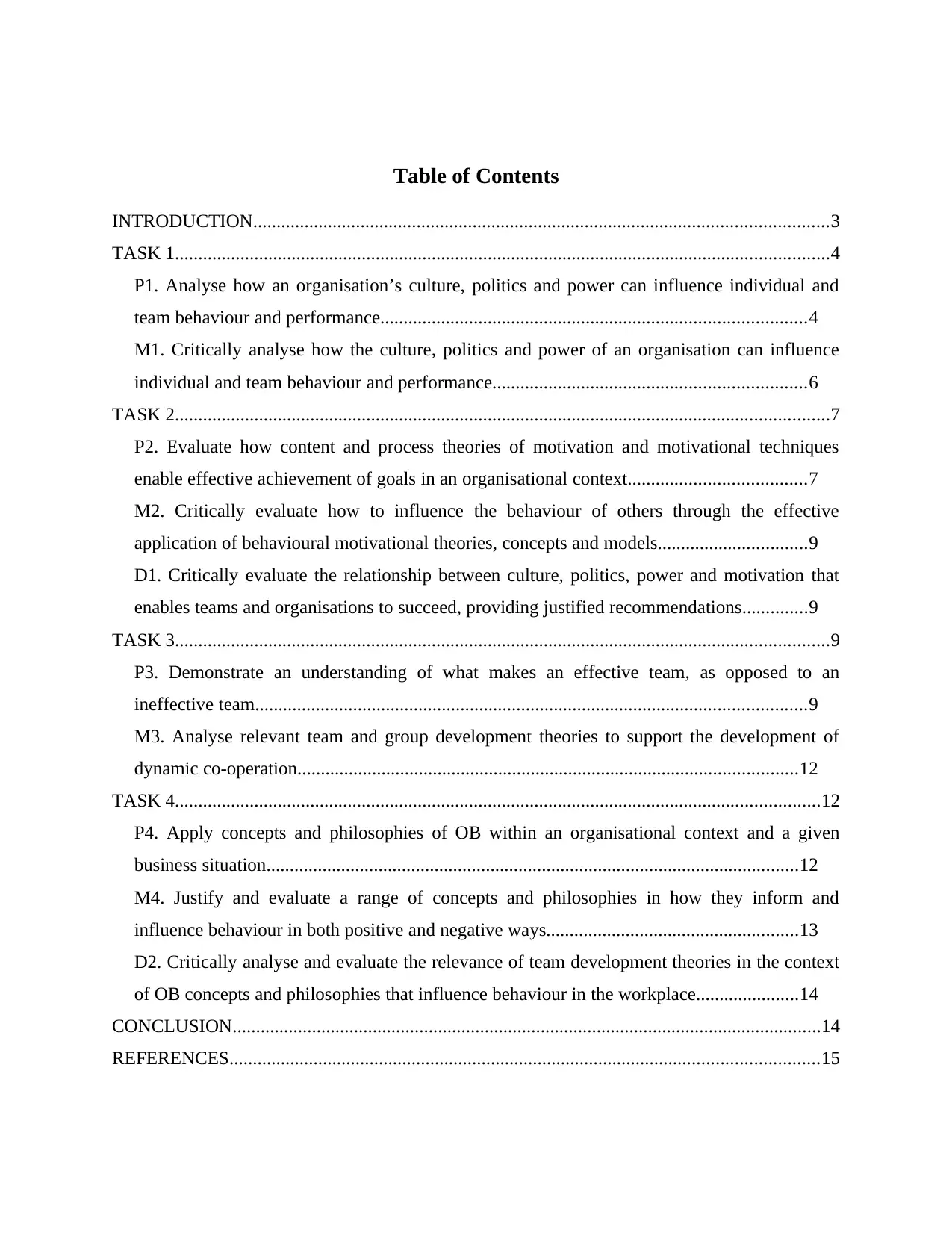
Table of Contents
INTRODUCTION...........................................................................................................................3
TASK 1............................................................................................................................................4
P1. Analyse how an organisation’s culture, politics and power can influence individual and
team behaviour and performance...........................................................................................4
M1. Critically analyse how the culture, politics and power of an organisation can influence
individual and team behaviour and performance...................................................................6
TASK 2............................................................................................................................................7
P2. Evaluate how content and process theories of motivation and motivational techniques
enable effective achievement of goals in an organisational context......................................7
M2. Critically evaluate how to influence the behaviour of others through the effective
application of behavioural motivational theories, concepts and models................................9
D1. Critically evaluate the relationship between culture, politics, power and motivation that
enables teams and organisations to succeed, providing justified recommendations..............9
TASK 3............................................................................................................................................9
P3. Demonstrate an understanding of what makes an effective team, as opposed to an
ineffective team......................................................................................................................9
M3. Analyse relevant team and group development theories to support the development of
dynamic co-operation...........................................................................................................12
TASK 4..........................................................................................................................................12
P4. Apply concepts and philosophies of OB within an organisational context and a given
business situation..................................................................................................................12
M4. Justify and evaluate a range of concepts and philosophies in how they inform and
influence behaviour in both positive and negative ways......................................................13
D2. Critically analyse and evaluate the relevance of team development theories in the context
of OB concepts and philosophies that influence behaviour in the workplace......................14
CONCLUSION..............................................................................................................................14
REFERENCES..............................................................................................................................15
INTRODUCTION...........................................................................................................................3
TASK 1............................................................................................................................................4
P1. Analyse how an organisation’s culture, politics and power can influence individual and
team behaviour and performance...........................................................................................4
M1. Critically analyse how the culture, politics and power of an organisation can influence
individual and team behaviour and performance...................................................................6
TASK 2............................................................................................................................................7
P2. Evaluate how content and process theories of motivation and motivational techniques
enable effective achievement of goals in an organisational context......................................7
M2. Critically evaluate how to influence the behaviour of others through the effective
application of behavioural motivational theories, concepts and models................................9
D1. Critically evaluate the relationship between culture, politics, power and motivation that
enables teams and organisations to succeed, providing justified recommendations..............9
TASK 3............................................................................................................................................9
P3. Demonstrate an understanding of what makes an effective team, as opposed to an
ineffective team......................................................................................................................9
M3. Analyse relevant team and group development theories to support the development of
dynamic co-operation...........................................................................................................12
TASK 4..........................................................................................................................................12
P4. Apply concepts and philosophies of OB within an organisational context and a given
business situation..................................................................................................................12
M4. Justify and evaluate a range of concepts and philosophies in how they inform and
influence behaviour in both positive and negative ways......................................................13
D2. Critically analyse and evaluate the relevance of team development theories in the context
of OB concepts and philosophies that influence behaviour in the workplace......................14
CONCLUSION..............................................................................................................................14
REFERENCES..............................................................................................................................15

⊘ This is a preview!⊘
Do you want full access?
Subscribe today to unlock all pages.

Trusted by 1+ million students worldwide
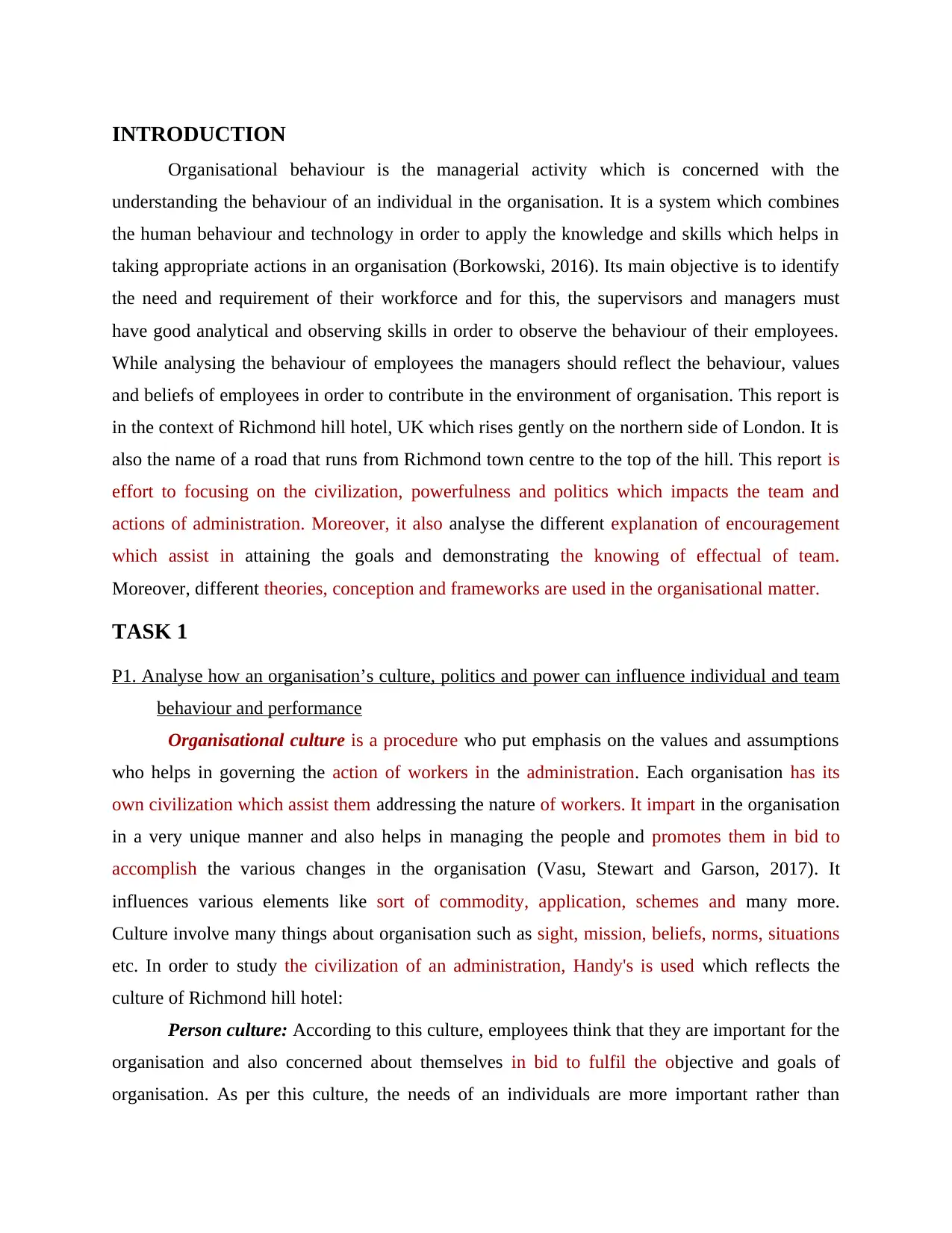
INTRODUCTION
Organisational behaviour is the managerial activity which is concerned with the
understanding the behaviour of an individual in the organisation. It is a system which combines
the human behaviour and technology in order to apply the knowledge and skills which helps in
taking appropriate actions in an organisation (Borkowski, 2016). Its main objective is to identify
the need and requirement of their workforce and for this, the supervisors and managers must
have good analytical and observing skills in order to observe the behaviour of their employees.
While analysing the behaviour of employees the managers should reflect the behaviour, values
and beliefs of employees in order to contribute in the environment of organisation. This report is
in the context of Richmond hill hotel, UK which rises gently on the northern side of London. It is
also the name of a road that runs from Richmond town centre to the top of the hill. This report is
effort to focusing on the civilization, powerfulness and politics which impacts the team and
actions of administration. Moreover, it also analyse the different explanation of encouragement
which assist in attaining the goals and demonstrating the knowing of effectual of team.
Moreover, different theories, conception and frameworks are used in the organisational matter.
TASK 1
P1. Analyse how an organisation’s culture, politics and power can influence individual and team
behaviour and performance
Organisational culture is a procedure who put emphasis on the values and assumptions
who helps in governing the action of workers in the administration. Each organisation has its
own civilization which assist them addressing the nature of workers. It impart in the organisation
in a very unique manner and also helps in managing the people and promotes them in bid to
accomplish the various changes in the organisation (Vasu, Stewart and Garson, 2017). It
influences various elements like sort of commodity, application, schemes and many more.
Culture involve many things about organisation such as sight, mission, beliefs, norms, situations
etc. In order to study the civilization of an administration, Handy's is used which reflects the
culture of Richmond hill hotel:
Person culture: According to this culture, employees think that they are important for the
organisation and also concerned about themselves in bid to fulfil the objective and goals of
organisation. As per this culture, the needs of an individuals are more important rather than
Organisational behaviour is the managerial activity which is concerned with the
understanding the behaviour of an individual in the organisation. It is a system which combines
the human behaviour and technology in order to apply the knowledge and skills which helps in
taking appropriate actions in an organisation (Borkowski, 2016). Its main objective is to identify
the need and requirement of their workforce and for this, the supervisors and managers must
have good analytical and observing skills in order to observe the behaviour of their employees.
While analysing the behaviour of employees the managers should reflect the behaviour, values
and beliefs of employees in order to contribute in the environment of organisation. This report is
in the context of Richmond hill hotel, UK which rises gently on the northern side of London. It is
also the name of a road that runs from Richmond town centre to the top of the hill. This report is
effort to focusing on the civilization, powerfulness and politics which impacts the team and
actions of administration. Moreover, it also analyse the different explanation of encouragement
which assist in attaining the goals and demonstrating the knowing of effectual of team.
Moreover, different theories, conception and frameworks are used in the organisational matter.
TASK 1
P1. Analyse how an organisation’s culture, politics and power can influence individual and team
behaviour and performance
Organisational culture is a procedure who put emphasis on the values and assumptions
who helps in governing the action of workers in the administration. Each organisation has its
own civilization which assist them addressing the nature of workers. It impart in the organisation
in a very unique manner and also helps in managing the people and promotes them in bid to
accomplish the various changes in the organisation (Vasu, Stewart and Garson, 2017). It
influences various elements like sort of commodity, application, schemes and many more.
Culture involve many things about organisation such as sight, mission, beliefs, norms, situations
etc. In order to study the civilization of an administration, Handy's is used which reflects the
culture of Richmond hill hotel:
Person culture: According to this culture, employees think that they are important for the
organisation and also concerned about themselves in bid to fulfil the objective and goals of
organisation. As per this culture, the needs of an individuals are more important rather than
Paraphrase This Document
Need a fresh take? Get an instant paraphrase of this document with our AI Paraphraser
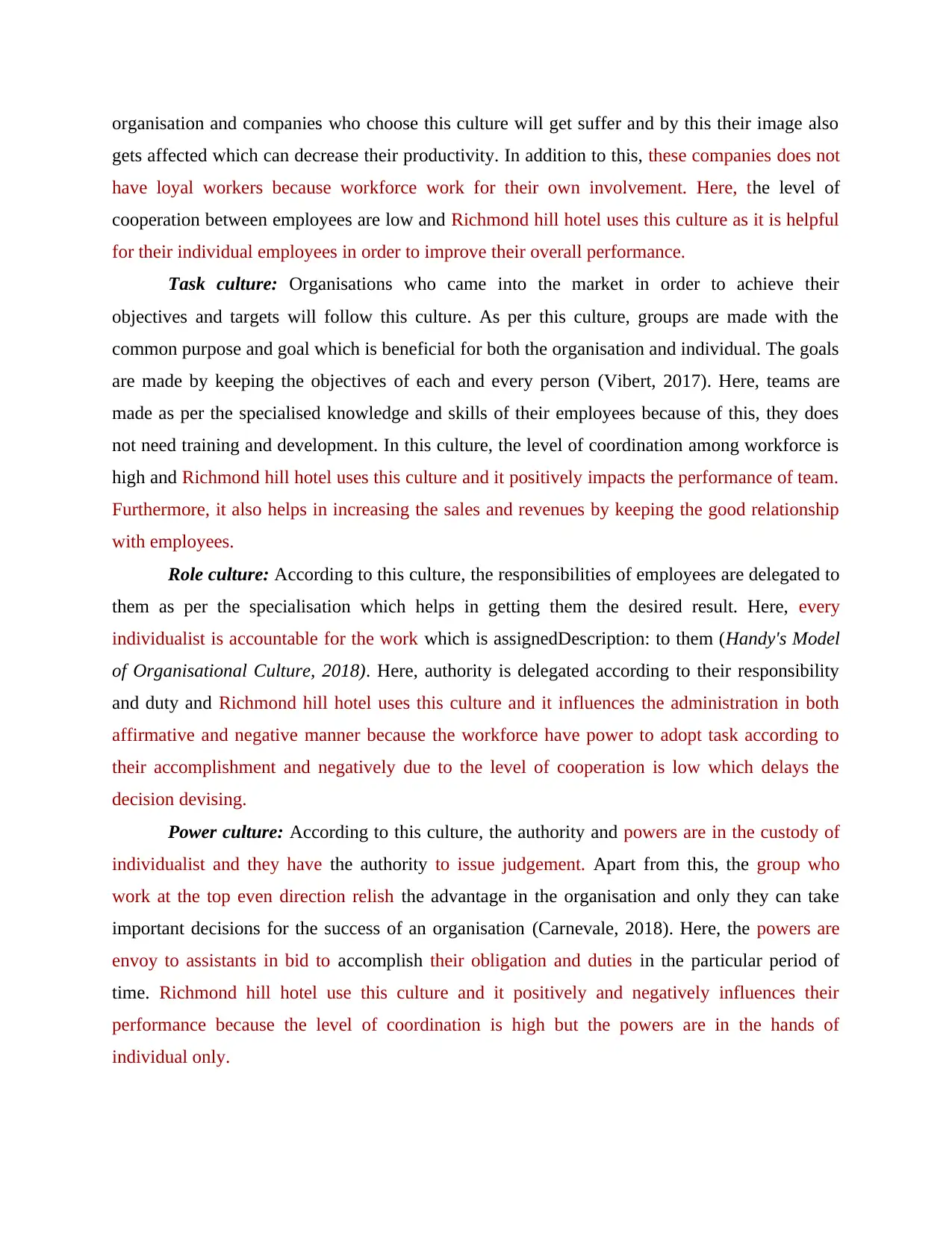
organisation and companies who choose this culture will get suffer and by this their image also
gets affected which can decrease their productivity. In addition to this, these companies does not
have loyal workers because workforce work for their own involvement. Here, the level of
cooperation between employees are low and Richmond hill hotel uses this culture as it is helpful
for their individual employees in order to improve their overall performance.
Task culture: Organisations who came into the market in order to achieve their
objectives and targets will follow this culture. As per this culture, groups are made with the
common purpose and goal which is beneficial for both the organisation and individual. The goals
are made by keeping the objectives of each and every person (Vibert, 2017). Here, teams are
made as per the specialised knowledge and skills of their employees because of this, they does
not need training and development. In this culture, the level of coordination among workforce is
high and Richmond hill hotel uses this culture and it positively impacts the performance of team.
Furthermore, it also helps in increasing the sales and revenues by keeping the good relationship
with employees.
Role culture: According to this culture, the responsibilities of employees are delegated to
them as per the specialisation which helps in getting them the desired result. Here, every
individualist is accountable for the work which is assignedDescription: to them (Handy's Model
of Organisational Culture, 2018). Here, authority is delegated according to their responsibility
and duty and Richmond hill hotel uses this culture and it influences the administration in both
affirmative and negative manner because the workforce have power to adopt task according to
their accomplishment and negatively due to the level of cooperation is low which delays the
decision devising.
Power culture: According to this culture, the authority and powers are in the custody of
individualist and they have the authority to issue judgement. Apart from this, the group who
work at the top even direction relish the advantage in the organisation and only they can take
important decisions for the success of an organisation (Carnevale, 2018). Here, the powers are
envoy to assistants in bid to accomplish their obligation and duties in the particular period of
time. Richmond hill hotel use this culture and it positively and negatively influences their
performance because the level of coordination is high but the powers are in the hands of
individual only.
gets affected which can decrease their productivity. In addition to this, these companies does not
have loyal workers because workforce work for their own involvement. Here, the level of
cooperation between employees are low and Richmond hill hotel uses this culture as it is helpful
for their individual employees in order to improve their overall performance.
Task culture: Organisations who came into the market in order to achieve their
objectives and targets will follow this culture. As per this culture, groups are made with the
common purpose and goal which is beneficial for both the organisation and individual. The goals
are made by keeping the objectives of each and every person (Vibert, 2017). Here, teams are
made as per the specialised knowledge and skills of their employees because of this, they does
not need training and development. In this culture, the level of coordination among workforce is
high and Richmond hill hotel uses this culture and it positively impacts the performance of team.
Furthermore, it also helps in increasing the sales and revenues by keeping the good relationship
with employees.
Role culture: According to this culture, the responsibilities of employees are delegated to
them as per the specialisation which helps in getting them the desired result. Here, every
individualist is accountable for the work which is assignedDescription: to them (Handy's Model
of Organisational Culture, 2018). Here, authority is delegated according to their responsibility
and duty and Richmond hill hotel uses this culture and it influences the administration in both
affirmative and negative manner because the workforce have power to adopt task according to
their accomplishment and negatively due to the level of cooperation is low which delays the
decision devising.
Power culture: According to this culture, the authority and powers are in the custody of
individualist and they have the authority to issue judgement. Apart from this, the group who
work at the top even direction relish the advantage in the organisation and only they can take
important decisions for the success of an organisation (Carnevale, 2018). Here, the powers are
envoy to assistants in bid to accomplish their obligation and duties in the particular period of
time. Richmond hill hotel use this culture and it positively and negatively influences their
performance because the level of coordination is high but the powers are in the hands of
individual only.
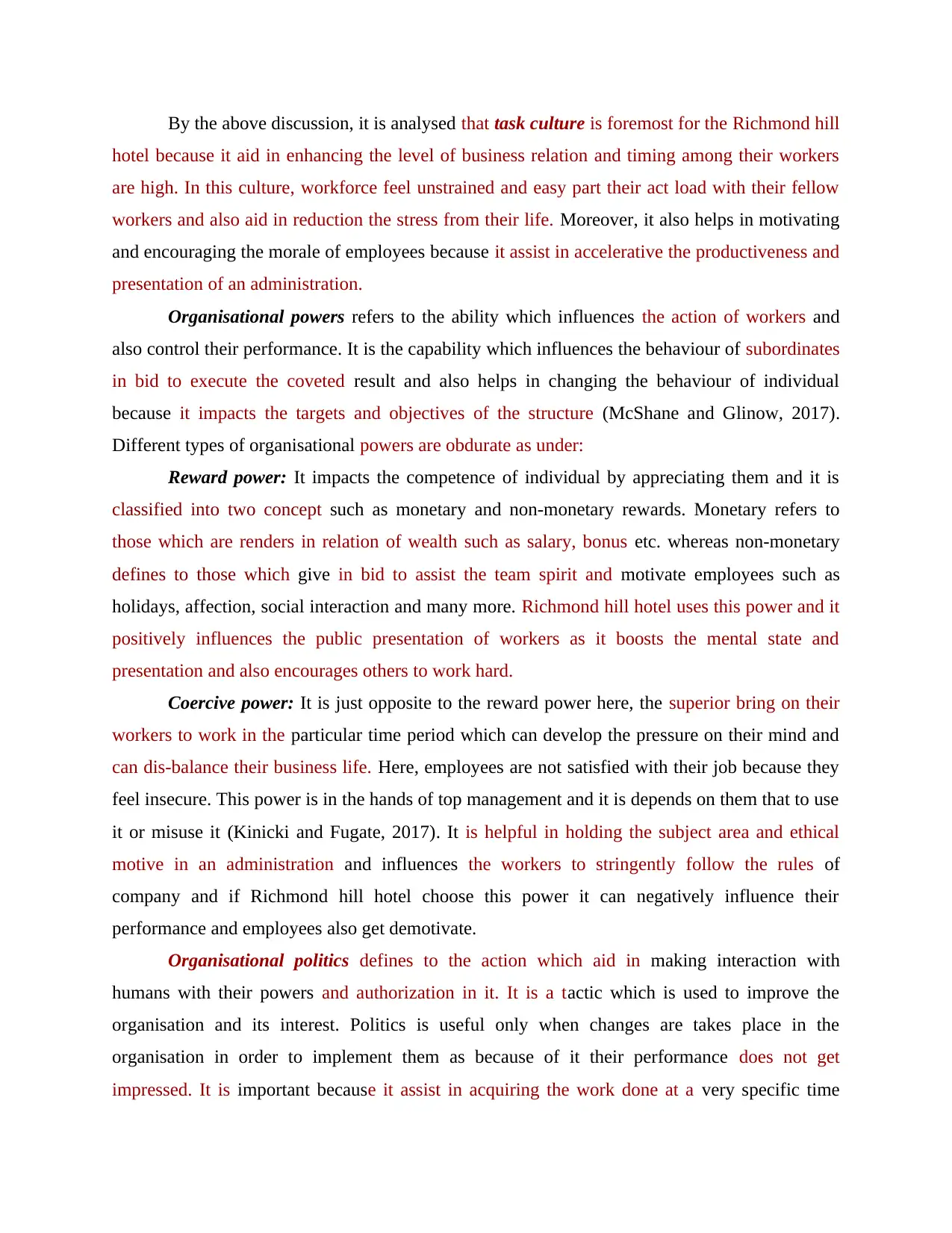
By the above discussion, it is analysed that task culture is foremost for the Richmond hill
hotel because it aid in enhancing the level of business relation and timing among their workers
are high. In this culture, workforce feel unstrained and easy part their act load with their fellow
workers and also aid in reduction the stress from their life. Moreover, it also helps in motivating
and encouraging the morale of employees because it assist in accelerative the productiveness and
presentation of an administration.
Organisational powers refers to the ability which influences the action of workers and
also control their performance. It is the capability which influences the behaviour of subordinates
in bid to execute the coveted result and also helps in changing the behaviour of individual
because it impacts the targets and objectives of the structure (McShane and Glinow, 2017).
Different types of organisational powers are obdurate as under:
Reward power: It impacts the competence of individual by appreciating them and it is
classified into two concept such as monetary and non-monetary rewards. Monetary refers to
those which are renders in relation of wealth such as salary, bonus etc. whereas non-monetary
defines to those which give in bid to assist the team spirit and motivate employees such as
holidays, affection, social interaction and many more. Richmond hill hotel uses this power and it
positively influences the public presentation of workers as it boosts the mental state and
presentation and also encourages others to work hard.
Coercive power: It is just opposite to the reward power here, the superior bring on their
workers to work in the particular time period which can develop the pressure on their mind and
can dis-balance their business life. Here, employees are not satisfied with their job because they
feel insecure. This power is in the hands of top management and it is depends on them that to use
it or misuse it (Kinicki and Fugate, 2017). It is helpful in holding the subject area and ethical
motive in an administration and influences the workers to stringently follow the rules of
company and if Richmond hill hotel choose this power it can negatively influence their
performance and employees also get demotivate.
Organisational politics defines to the action which aid in making interaction with
humans with their powers and authorization in it. It is a tactic which is used to improve the
organisation and its interest. Politics is useful only when changes are takes place in the
organisation in order to implement them as because of it their performance does not get
impressed. It is important because it assist in acquiring the work done at a very specific time
hotel because it aid in enhancing the level of business relation and timing among their workers
are high. In this culture, workforce feel unstrained and easy part their act load with their fellow
workers and also aid in reduction the stress from their life. Moreover, it also helps in motivating
and encouraging the morale of employees because it assist in accelerative the productiveness and
presentation of an administration.
Organisational powers refers to the ability which influences the action of workers and
also control their performance. It is the capability which influences the behaviour of subordinates
in bid to execute the coveted result and also helps in changing the behaviour of individual
because it impacts the targets and objectives of the structure (McShane and Glinow, 2017).
Different types of organisational powers are obdurate as under:
Reward power: It impacts the competence of individual by appreciating them and it is
classified into two concept such as monetary and non-monetary rewards. Monetary refers to
those which are renders in relation of wealth such as salary, bonus etc. whereas non-monetary
defines to those which give in bid to assist the team spirit and motivate employees such as
holidays, affection, social interaction and many more. Richmond hill hotel uses this power and it
positively influences the public presentation of workers as it boosts the mental state and
presentation and also encourages others to work hard.
Coercive power: It is just opposite to the reward power here, the superior bring on their
workers to work in the particular time period which can develop the pressure on their mind and
can dis-balance their business life. Here, employees are not satisfied with their job because they
feel insecure. This power is in the hands of top management and it is depends on them that to use
it or misuse it (Kinicki and Fugate, 2017). It is helpful in holding the subject area and ethical
motive in an administration and influences the workers to stringently follow the rules of
company and if Richmond hill hotel choose this power it can negatively influence their
performance and employees also get demotivate.
Organisational politics defines to the action which aid in making interaction with
humans with their powers and authorization in it. It is a tactic which is used to improve the
organisation and its interest. Politics is useful only when changes are takes place in the
organisation in order to implement them as because of it their performance does not get
impressed. It is important because it assist in acquiring the work done at a very specific time
⊘ This is a preview!⊘
Do you want full access?
Subscribe today to unlock all pages.

Trusted by 1+ million students worldwide
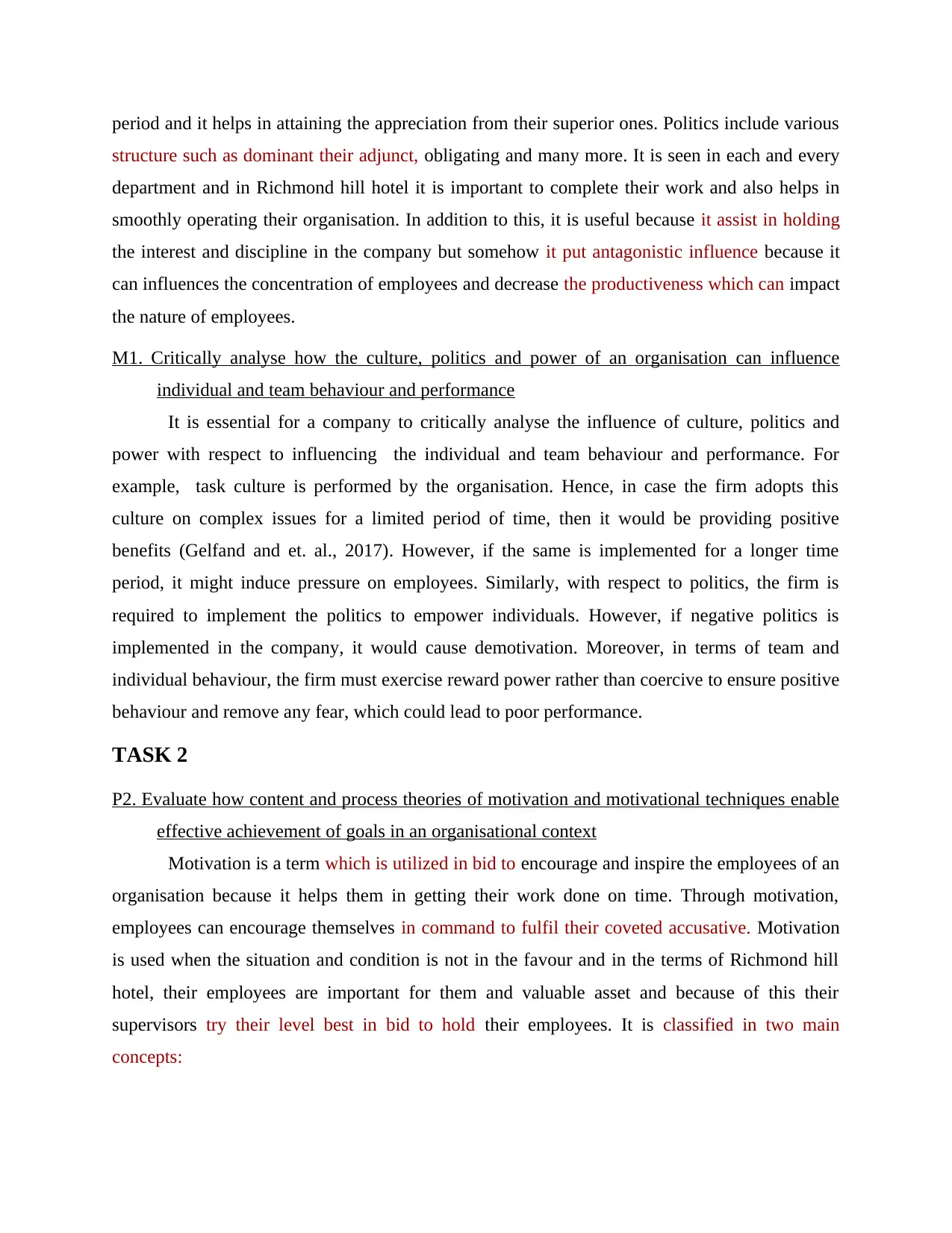
period and it helps in attaining the appreciation from their superior ones. Politics include various
structure such as dominant their adjunct, obligating and many more. It is seen in each and every
department and in Richmond hill hotel it is important to complete their work and also helps in
smoothly operating their organisation. In addition to this, it is useful because it assist in holding
the interest and discipline in the company but somehow it put antagonistic influence because it
can influences the concentration of employees and decrease the productiveness which can impact
the nature of employees.
M1. Critically analyse how the culture, politics and power of an organisation can influence
individual and team behaviour and performance
It is essential for a company to critically analyse the influence of culture, politics and
power with respect to influencing the individual and team behaviour and performance. For
example, task culture is performed by the organisation. Hence, in case the firm adopts this
culture on complex issues for a limited period of time, then it would be providing positive
benefits (Gelfand and et. al., 2017). However, if the same is implemented for a longer time
period, it might induce pressure on employees. Similarly, with respect to politics, the firm is
required to implement the politics to empower individuals. However, if negative politics is
implemented in the company, it would cause demotivation. Moreover, in terms of team and
individual behaviour, the firm must exercise reward power rather than coercive to ensure positive
behaviour and remove any fear, which could lead to poor performance.
TASK 2
P2. Evaluate how content and process theories of motivation and motivational techniques enable
effective achievement of goals in an organisational context
Motivation is a term which is utilized in bid to encourage and inspire the employees of an
organisation because it helps them in getting their work done on time. Through motivation,
employees can encourage themselves in command to fulfil their coveted accusative. Motivation
is used when the situation and condition is not in the favour and in the terms of Richmond hill
hotel, their employees are important for them and valuable asset and because of this their
supervisors try their level best in bid to hold their employees. It is classified in two main
concepts:
structure such as dominant their adjunct, obligating and many more. It is seen in each and every
department and in Richmond hill hotel it is important to complete their work and also helps in
smoothly operating their organisation. In addition to this, it is useful because it assist in holding
the interest and discipline in the company but somehow it put antagonistic influence because it
can influences the concentration of employees and decrease the productiveness which can impact
the nature of employees.
M1. Critically analyse how the culture, politics and power of an organisation can influence
individual and team behaviour and performance
It is essential for a company to critically analyse the influence of culture, politics and
power with respect to influencing the individual and team behaviour and performance. For
example, task culture is performed by the organisation. Hence, in case the firm adopts this
culture on complex issues for a limited period of time, then it would be providing positive
benefits (Gelfand and et. al., 2017). However, if the same is implemented for a longer time
period, it might induce pressure on employees. Similarly, with respect to politics, the firm is
required to implement the politics to empower individuals. However, if negative politics is
implemented in the company, it would cause demotivation. Moreover, in terms of team and
individual behaviour, the firm must exercise reward power rather than coercive to ensure positive
behaviour and remove any fear, which could lead to poor performance.
TASK 2
P2. Evaluate how content and process theories of motivation and motivational techniques enable
effective achievement of goals in an organisational context
Motivation is a term which is utilized in bid to encourage and inspire the employees of an
organisation because it helps them in getting their work done on time. Through motivation,
employees can encourage themselves in command to fulfil their coveted accusative. Motivation
is used when the situation and condition is not in the favour and in the terms of Richmond hill
hotel, their employees are important for them and valuable asset and because of this their
supervisors try their level best in bid to hold their employees. It is classified in two main
concepts:
Paraphrase This Document
Need a fresh take? Get an instant paraphrase of this document with our AI Paraphraser
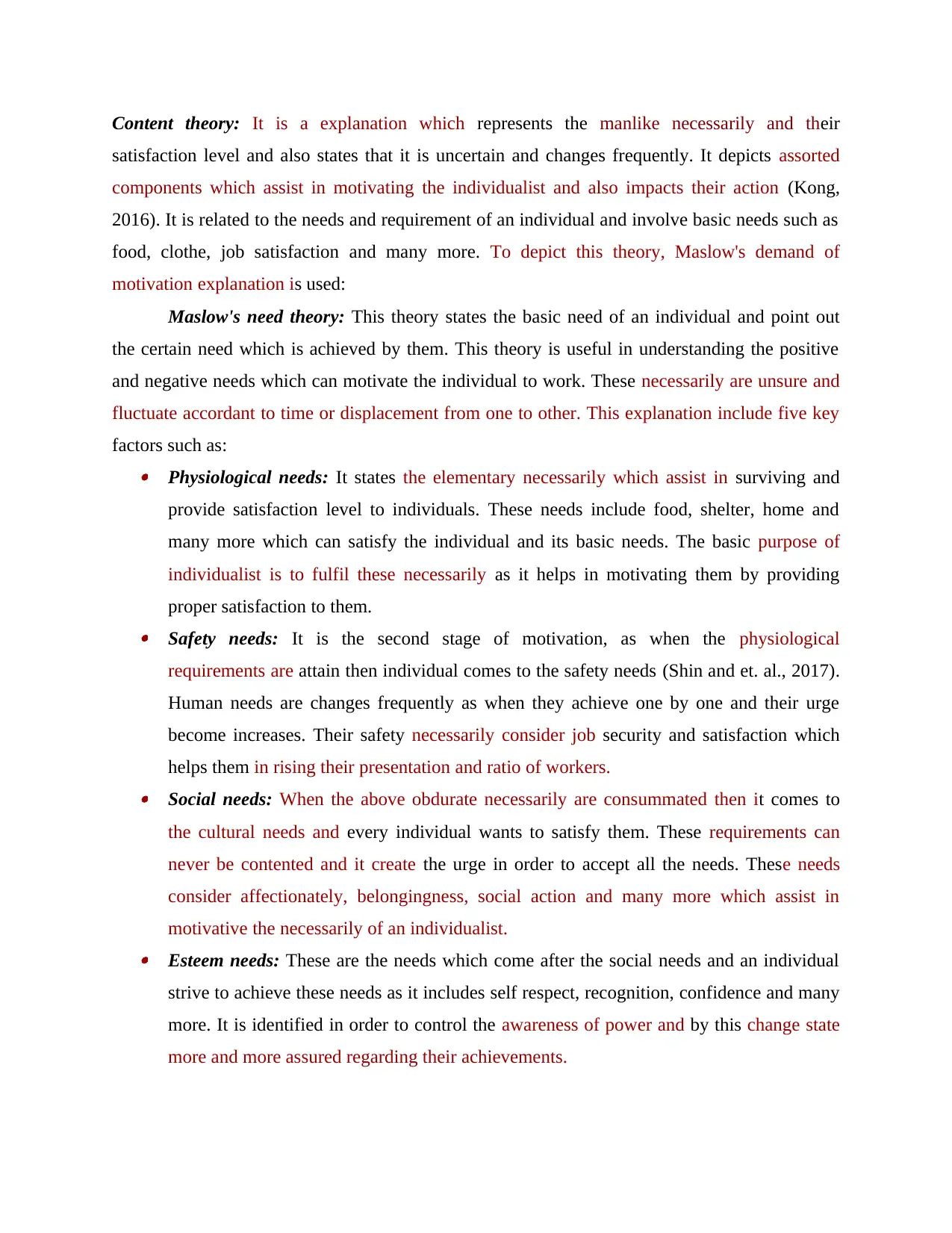
Content theory: It is a explanation which represents the manlike necessarily and their
satisfaction level and also states that it is uncertain and changes frequently. It depicts assorted
components which assist in motivating the individualist and also impacts their action (Kong,
2016). It is related to the needs and requirement of an individual and involve basic needs such as
food, clothe, job satisfaction and many more. To depict this theory, Maslow's demand of
motivation explanation is used:
Maslow's need theory: This theory states the basic need of an individual and point out
the certain need which is achieved by them. This theory is useful in understanding the positive
and negative needs which can motivate the individual to work. These necessarily are unsure and
fluctuate accordant to time or displacement from one to other. This explanation include five key
factors such as: Physiological needs: It states the elementary necessarily which assist in surviving and
provide satisfaction level to individuals. These needs include food, shelter, home and
many more which can satisfy the individual and its basic needs. The basic purpose of
individualist is to fulfil these necessarily as it helps in motivating them by providing
proper satisfaction to them. Safety needs: It is the second stage of motivation, as when the physiological
requirements are attain then individual comes to the safety needs (Shin and et. al., 2017).
Human needs are changes frequently as when they achieve one by one and their urge
become increases. Their safety necessarily consider job security and satisfaction which
helps them in rising their presentation and ratio of workers. Social needs: When the above obdurate necessarily are consummated then it comes to
the cultural needs and every individual wants to satisfy them. These requirements can
never be contented and it create the urge in order to accept all the needs. These needs
consider affectionately, belongingness, social action and many more which assist in
motivative the necessarily of an individualist. Esteem needs: These are the needs which come after the social needs and an individual
strive to achieve these needs as it includes self respect, recognition, confidence and many
more. It is identified in order to control the awareness of power and by this change state
more and more assured regarding their achievements.
satisfaction level and also states that it is uncertain and changes frequently. It depicts assorted
components which assist in motivating the individualist and also impacts their action (Kong,
2016). It is related to the needs and requirement of an individual and involve basic needs such as
food, clothe, job satisfaction and many more. To depict this theory, Maslow's demand of
motivation explanation is used:
Maslow's need theory: This theory states the basic need of an individual and point out
the certain need which is achieved by them. This theory is useful in understanding the positive
and negative needs which can motivate the individual to work. These necessarily are unsure and
fluctuate accordant to time or displacement from one to other. This explanation include five key
factors such as: Physiological needs: It states the elementary necessarily which assist in surviving and
provide satisfaction level to individuals. These needs include food, shelter, home and
many more which can satisfy the individual and its basic needs. The basic purpose of
individualist is to fulfil these necessarily as it helps in motivating them by providing
proper satisfaction to them. Safety needs: It is the second stage of motivation, as when the physiological
requirements are attain then individual comes to the safety needs (Shin and et. al., 2017).
Human needs are changes frequently as when they achieve one by one and their urge
become increases. Their safety necessarily consider job security and satisfaction which
helps them in rising their presentation and ratio of workers. Social needs: When the above obdurate necessarily are consummated then it comes to
the cultural needs and every individual wants to satisfy them. These requirements can
never be contented and it create the urge in order to accept all the needs. These needs
consider affectionately, belongingness, social action and many more which assist in
motivative the necessarily of an individualist. Esteem needs: These are the needs which come after the social needs and an individual
strive to achieve these needs as it includes self respect, recognition, confidence and many
more. It is identified in order to control the awareness of power and by this change state
more and more assured regarding their achievements.
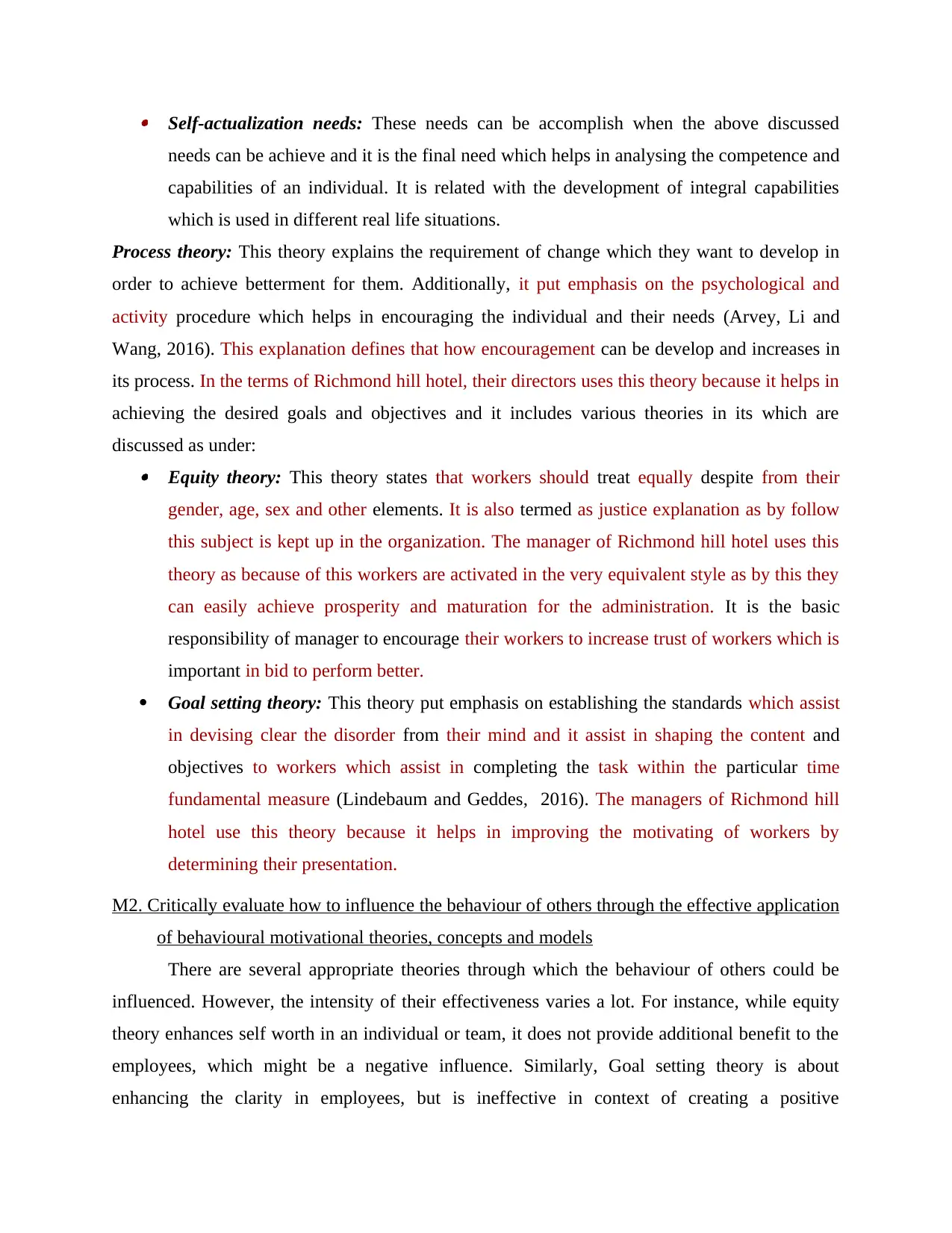
Self-actualization needs: These needs can be accomplish when the above discussed
needs can be achieve and it is the final need which helps in analysing the competence and
capabilities of an individual. It is related with the development of integral capabilities
which is used in different real life situations.
Process theory: This theory explains the requirement of change which they want to develop in
order to achieve betterment for them. Additionally, it put emphasis on the psychological and
activity procedure which helps in encouraging the individual and their needs (Arvey, Li and
Wang, 2016). This explanation defines that how encouragement can be develop and increases in
its process. In the terms of Richmond hill hotel, their directors uses this theory because it helps in
achieving the desired goals and objectives and it includes various theories in its which are
discussed as under: Equity theory: This theory states that workers should treat equally despite from their
gender, age, sex and other elements. It is also termed as justice explanation as by follow
this subject is kept up in the organization. The manager of Richmond hill hotel uses this
theory as because of this workers are activated in the very equivalent style as by this they
can easily achieve prosperity and maturation for the administration. It is the basic
responsibility of manager to encourage their workers to increase trust of workers which is
important in bid to perform better.
Goal setting theory: This theory put emphasis on establishing the standards which assist
in devising clear the disorder from their mind and it assist in shaping the content and
objectives to workers which assist in completing the task within the particular time
fundamental measure (Lindebaum and Geddes, 2016). The managers of Richmond hill
hotel use this theory because it helps in improving the motivating of workers by
determining their presentation.
M2. Critically evaluate how to influence the behaviour of others through the effective application
of behavioural motivational theories, concepts and models
There are several appropriate theories through which the behaviour of others could be
influenced. However, the intensity of their effectiveness varies a lot. For instance, while equity
theory enhances self worth in an individual or team, it does not provide additional benefit to the
employees, which might be a negative influence. Similarly, Goal setting theory is about
enhancing the clarity in employees, but is ineffective in context of creating a positive
needs can be achieve and it is the final need which helps in analysing the competence and
capabilities of an individual. It is related with the development of integral capabilities
which is used in different real life situations.
Process theory: This theory explains the requirement of change which they want to develop in
order to achieve betterment for them. Additionally, it put emphasis on the psychological and
activity procedure which helps in encouraging the individual and their needs (Arvey, Li and
Wang, 2016). This explanation defines that how encouragement can be develop and increases in
its process. In the terms of Richmond hill hotel, their directors uses this theory because it helps in
achieving the desired goals and objectives and it includes various theories in its which are
discussed as under: Equity theory: This theory states that workers should treat equally despite from their
gender, age, sex and other elements. It is also termed as justice explanation as by follow
this subject is kept up in the organization. The manager of Richmond hill hotel uses this
theory as because of this workers are activated in the very equivalent style as by this they
can easily achieve prosperity and maturation for the administration. It is the basic
responsibility of manager to encourage their workers to increase trust of workers which is
important in bid to perform better.
Goal setting theory: This theory put emphasis on establishing the standards which assist
in devising clear the disorder from their mind and it assist in shaping the content and
objectives to workers which assist in completing the task within the particular time
fundamental measure (Lindebaum and Geddes, 2016). The managers of Richmond hill
hotel use this theory because it helps in improving the motivating of workers by
determining their presentation.
M2. Critically evaluate how to influence the behaviour of others through the effective application
of behavioural motivational theories, concepts and models
There are several appropriate theories through which the behaviour of others could be
influenced. However, the intensity of their effectiveness varies a lot. For instance, while equity
theory enhances self worth in an individual or team, it does not provide additional benefit to the
employees, which might be a negative influence. Similarly, Goal setting theory is about
enhancing the clarity in employees, but is ineffective in context of creating a positive
⊘ This is a preview!⊘
Do you want full access?
Subscribe today to unlock all pages.

Trusted by 1+ million students worldwide
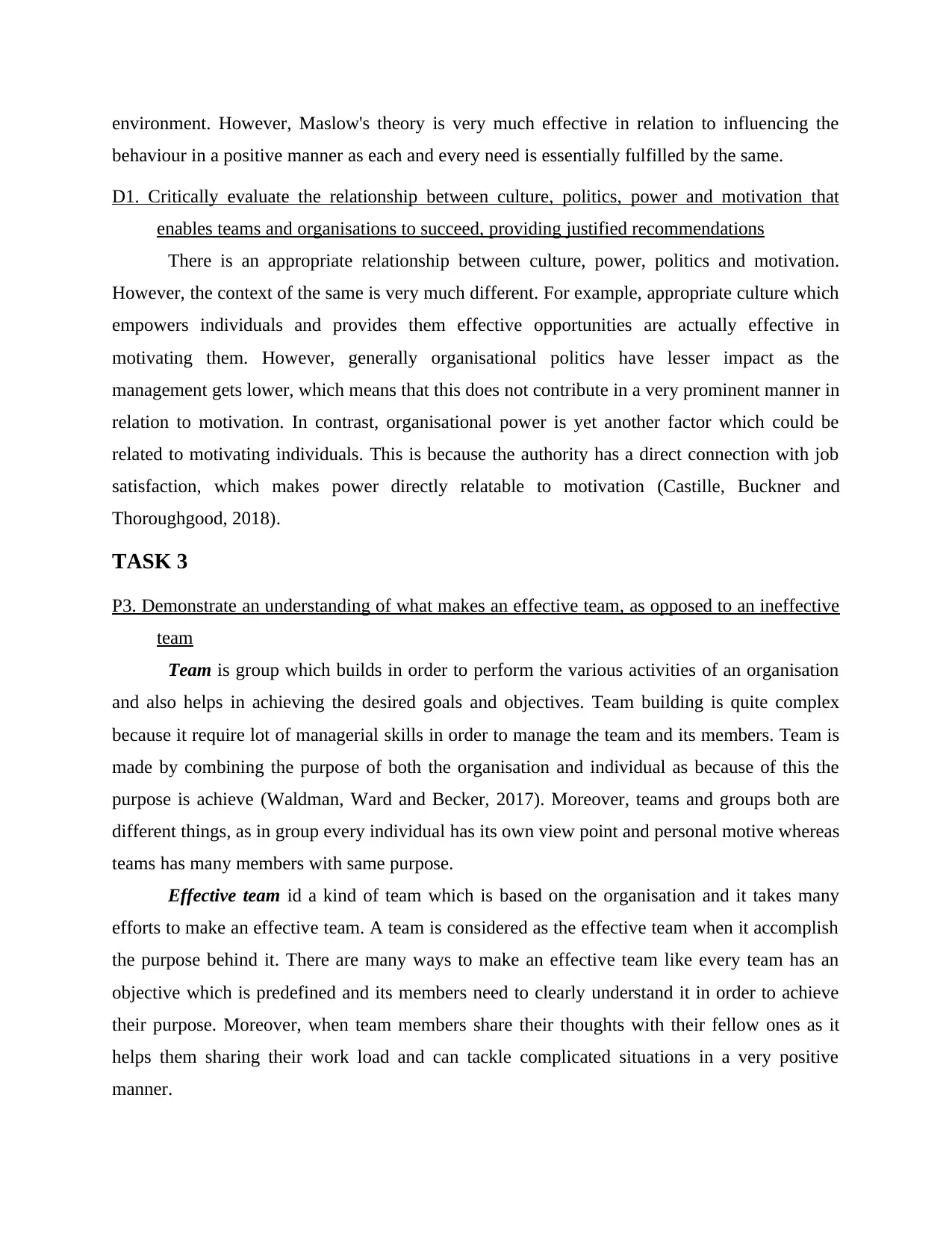
environment. However, Maslow's theory is very much effective in relation to influencing the
behaviour in a positive manner as each and every need is essentially fulfilled by the same.
D1. Critically evaluate the relationship between culture, politics, power and motivation that
enables teams and organisations to succeed, providing justified recommendations
There is an appropriate relationship between culture, power, politics and motivation.
However, the context of the same is very much different. For example, appropriate culture which
empowers individuals and provides them effective opportunities are actually effective in
motivating them. However, generally organisational politics have lesser impact as the
management gets lower, which means that this does not contribute in a very prominent manner in
relation to motivation. In contrast, organisational power is yet another factor which could be
related to motivating individuals. This is because the authority has a direct connection with job
satisfaction, which makes power directly relatable to motivation (Castille, Buckner and
Thoroughgood, 2018).
TASK 3
P3. Demonstrate an understanding of what makes an effective team, as opposed to an ineffective
team
Team is group which builds in order to perform the various activities of an organisation
and also helps in achieving the desired goals and objectives. Team building is quite complex
because it require lot of managerial skills in order to manage the team and its members. Team is
made by combining the purpose of both the organisation and individual as because of this the
purpose is achieve (Waldman, Ward and Becker, 2017). Moreover, teams and groups both are
different things, as in group every individual has its own view point and personal motive whereas
teams has many members with same purpose.
Effective team id a kind of team which is based on the organisation and it takes many
efforts to make an effective team. A team is considered as the effective team when it accomplish
the purpose behind it. There are many ways to make an effective team like every team has an
objective which is predefined and its members need to clearly understand it in order to achieve
their purpose. Moreover, when team members share their thoughts with their fellow ones as it
helps them sharing their work load and can tackle complicated situations in a very positive
manner.
behaviour in a positive manner as each and every need is essentially fulfilled by the same.
D1. Critically evaluate the relationship between culture, politics, power and motivation that
enables teams and organisations to succeed, providing justified recommendations
There is an appropriate relationship between culture, power, politics and motivation.
However, the context of the same is very much different. For example, appropriate culture which
empowers individuals and provides them effective opportunities are actually effective in
motivating them. However, generally organisational politics have lesser impact as the
management gets lower, which means that this does not contribute in a very prominent manner in
relation to motivation. In contrast, organisational power is yet another factor which could be
related to motivating individuals. This is because the authority has a direct connection with job
satisfaction, which makes power directly relatable to motivation (Castille, Buckner and
Thoroughgood, 2018).
TASK 3
P3. Demonstrate an understanding of what makes an effective team, as opposed to an ineffective
team
Team is group which builds in order to perform the various activities of an organisation
and also helps in achieving the desired goals and objectives. Team building is quite complex
because it require lot of managerial skills in order to manage the team and its members. Team is
made by combining the purpose of both the organisation and individual as because of this the
purpose is achieve (Waldman, Ward and Becker, 2017). Moreover, teams and groups both are
different things, as in group every individual has its own view point and personal motive whereas
teams has many members with same purpose.
Effective team id a kind of team which is based on the organisation and it takes many
efforts to make an effective team. A team is considered as the effective team when it accomplish
the purpose behind it. There are many ways to make an effective team like every team has an
objective which is predefined and its members need to clearly understand it in order to achieve
their purpose. Moreover, when team members share their thoughts with their fellow ones as it
helps them sharing their work load and can tackle complicated situations in a very positive
manner.
Paraphrase This Document
Need a fresh take? Get an instant paraphrase of this document with our AI Paraphraser
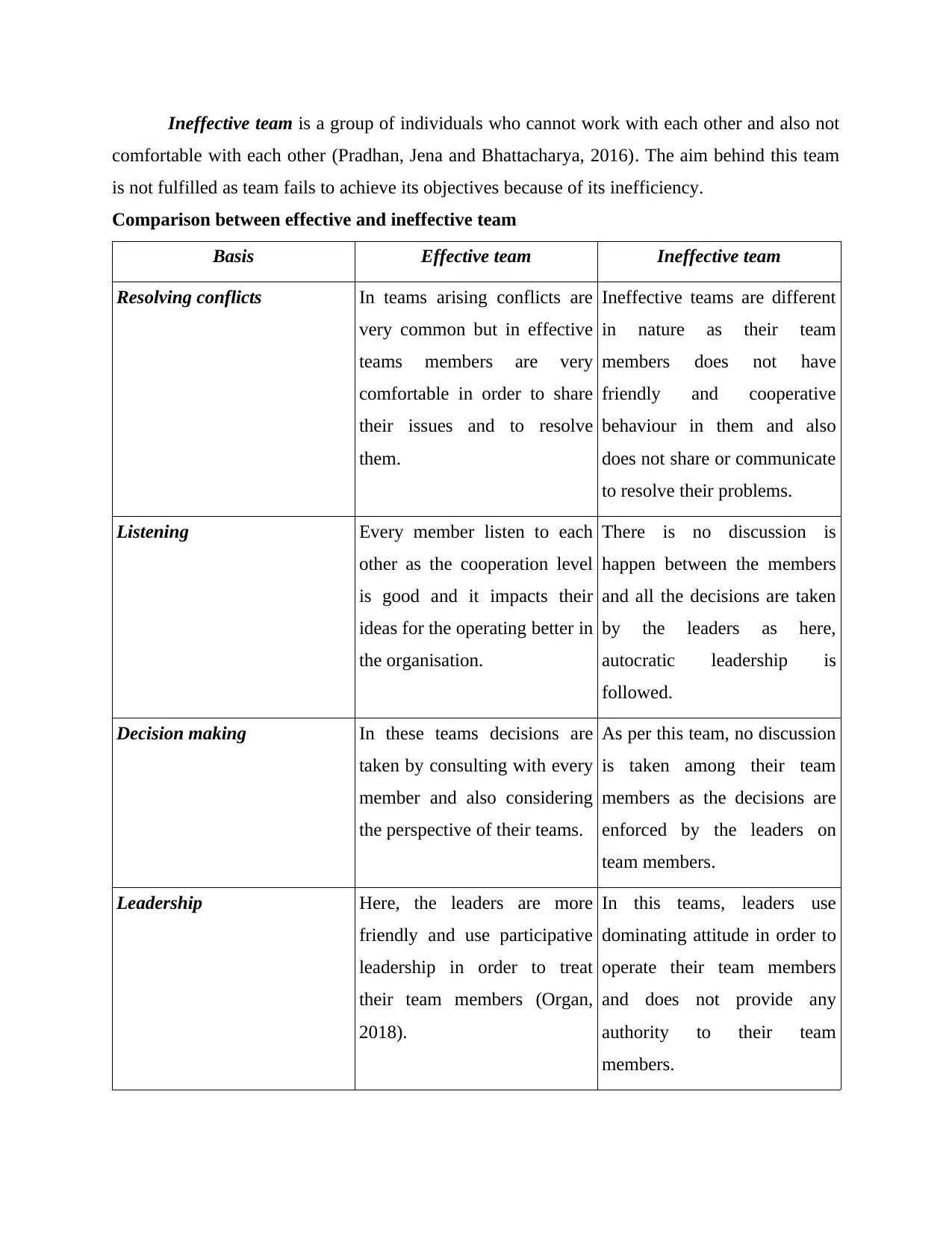
Ineffective team is a group of individuals who cannot work with each other and also not
comfortable with each other (Pradhan, Jena and Bhattacharya, 2016). The aim behind this team
is not fulfilled as team fails to achieve its objectives because of its inefficiency.
Comparison between effective and ineffective team
Basis Effective team Ineffective team
Resolving conflicts In teams arising conflicts are
very common but in effective
teams members are very
comfortable in order to share
their issues and to resolve
them.
Ineffective teams are different
in nature as their team
members does not have
friendly and cooperative
behaviour in them and also
does not share or communicate
to resolve their problems.
Listening Every member listen to each
other as the cooperation level
is good and it impacts their
ideas for the operating better in
the organisation.
There is no discussion is
happen between the members
and all the decisions are taken
by the leaders as here,
autocratic leadership is
followed.
Decision making In these teams decisions are
taken by consulting with every
member and also considering
the perspective of their teams.
As per this team, no discussion
is taken among their team
members as the decisions are
enforced by the leaders on
team members.
Leadership Here, the leaders are more
friendly and use participative
leadership in order to treat
their team members (Organ,
2018).
In this teams, leaders use
dominating attitude in order to
operate their team members
and does not provide any
authority to their team
members.
comfortable with each other (Pradhan, Jena and Bhattacharya, 2016). The aim behind this team
is not fulfilled as team fails to achieve its objectives because of its inefficiency.
Comparison between effective and ineffective team
Basis Effective team Ineffective team
Resolving conflicts In teams arising conflicts are
very common but in effective
teams members are very
comfortable in order to share
their issues and to resolve
them.
Ineffective teams are different
in nature as their team
members does not have
friendly and cooperative
behaviour in them and also
does not share or communicate
to resolve their problems.
Listening Every member listen to each
other as the cooperation level
is good and it impacts their
ideas for the operating better in
the organisation.
There is no discussion is
happen between the members
and all the decisions are taken
by the leaders as here,
autocratic leadership is
followed.
Decision making In these teams decisions are
taken by consulting with every
member and also considering
the perspective of their teams.
As per this team, no discussion
is taken among their team
members as the decisions are
enforced by the leaders on
team members.
Leadership Here, the leaders are more
friendly and use participative
leadership in order to treat
their team members (Organ,
2018).
In this teams, leaders use
dominating attitude in order to
operate their team members
and does not provide any
authority to their team
members.
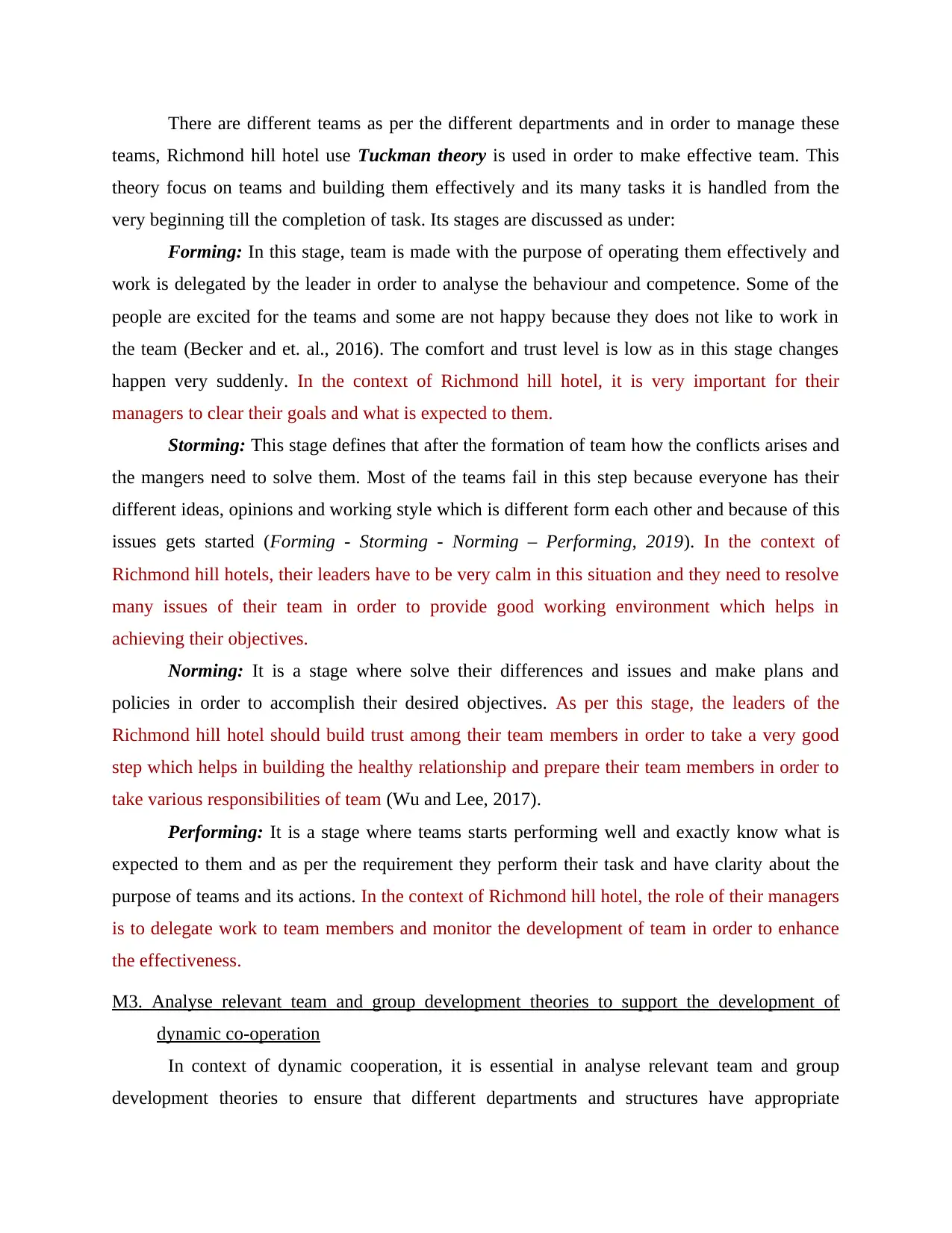
There are different teams as per the different departments and in order to manage these
teams, Richmond hill hotel use Tuckman theory is used in order to make effective team. This
theory focus on teams and building them effectively and its many tasks it is handled from the
very beginning till the completion of task. Its stages are discussed as under:
Forming: In this stage, team is made with the purpose of operating them effectively and
work is delegated by the leader in order to analyse the behaviour and competence. Some of the
people are excited for the teams and some are not happy because they does not like to work in
the team (Becker and et. al., 2016). The comfort and trust level is low as in this stage changes
happen very suddenly. In the context of Richmond hill hotel, it is very important for their
managers to clear their goals and what is expected to them.
Storming: This stage defines that after the formation of team how the conflicts arises and
the mangers need to solve them. Most of the teams fail in this step because everyone has their
different ideas, opinions and working style which is different form each other and because of this
issues gets started (Forming - Storming - Norming – Performing, 2019). In the context of
Richmond hill hotels, their leaders have to be very calm in this situation and they need to resolve
many issues of their team in order to provide good working environment which helps in
achieving their objectives.
Norming: It is a stage where solve their differences and issues and make plans and
policies in order to accomplish their desired objectives. As per this stage, the leaders of the
Richmond hill hotel should build trust among their team members in order to take a very good
step which helps in building the healthy relationship and prepare their team members in order to
take various responsibilities of team (Wu and Lee, 2017).
Performing: It is a stage where teams starts performing well and exactly know what is
expected to them and as per the requirement they perform their task and have clarity about the
purpose of teams and its actions. In the context of Richmond hill hotel, the role of their managers
is to delegate work to team members and monitor the development of team in order to enhance
the effectiveness.
M3. Analyse relevant team and group development theories to support the development of
dynamic co-operation
In context of dynamic cooperation, it is essential in analyse relevant team and group
development theories to ensure that different departments and structures have appropriate
teams, Richmond hill hotel use Tuckman theory is used in order to make effective team. This
theory focus on teams and building them effectively and its many tasks it is handled from the
very beginning till the completion of task. Its stages are discussed as under:
Forming: In this stage, team is made with the purpose of operating them effectively and
work is delegated by the leader in order to analyse the behaviour and competence. Some of the
people are excited for the teams and some are not happy because they does not like to work in
the team (Becker and et. al., 2016). The comfort and trust level is low as in this stage changes
happen very suddenly. In the context of Richmond hill hotel, it is very important for their
managers to clear their goals and what is expected to them.
Storming: This stage defines that after the formation of team how the conflicts arises and
the mangers need to solve them. Most of the teams fail in this step because everyone has their
different ideas, opinions and working style which is different form each other and because of this
issues gets started (Forming - Storming - Norming – Performing, 2019). In the context of
Richmond hill hotels, their leaders have to be very calm in this situation and they need to resolve
many issues of their team in order to provide good working environment which helps in
achieving their objectives.
Norming: It is a stage where solve their differences and issues and make plans and
policies in order to accomplish their desired objectives. As per this stage, the leaders of the
Richmond hill hotel should build trust among their team members in order to take a very good
step which helps in building the healthy relationship and prepare their team members in order to
take various responsibilities of team (Wu and Lee, 2017).
Performing: It is a stage where teams starts performing well and exactly know what is
expected to them and as per the requirement they perform their task and have clarity about the
purpose of teams and its actions. In the context of Richmond hill hotel, the role of their managers
is to delegate work to team members and monitor the development of team in order to enhance
the effectiveness.
M3. Analyse relevant team and group development theories to support the development of
dynamic co-operation
In context of dynamic cooperation, it is essential in analyse relevant team and group
development theories to ensure that different departments and structures have appropriate
⊘ This is a preview!⊘
Do you want full access?
Subscribe today to unlock all pages.

Trusted by 1+ million students worldwide
1 out of 17
Related Documents
Your All-in-One AI-Powered Toolkit for Academic Success.
+13062052269
info@desklib.com
Available 24*7 on WhatsApp / Email
![[object Object]](/_next/static/media/star-bottom.7253800d.svg)
Unlock your academic potential
Copyright © 2020–2026 A2Z Services. All Rights Reserved. Developed and managed by ZUCOL.




